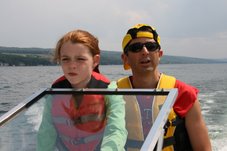I’ve been transitioning last year from UnitedStreaming Video to EdVideo Online Service available through school/WXXI http://www.wxxi.org/education/k12/ondemand.html . The content available there seems more organized and more school-related although not as fresh, current and authentic as what’s available on free online video resources. After using and viewing with each of these four online video services, it is clear there are not all equal. The Wesley Fryer/Rushton Hurley podcast was very interesting…a keeper. I never heard or thought of asynchronous sharing as a convenient advantage of online video. Also new to my ears was the use of a Creative Common license and [noncommercial] attribution …leaving open the possibility to share and alter content (unless I have misunderstood this). A paraphrased/quoted statement from their discussion really got me thinking about the shift in thinking about media. “The old way of thinking of media access is control access and it has value; the new way of thinking is to give it away and it has value…the more people that have access to ideas, the better …that’s where the power lies in freely sharing and attribution only sharing.” I think this shift in old-new media emphasizes the increased need for media literacy to be integrated in our regular curriculum.
As for ease of use for student & teachers: Teacher Tube videos uploaded right away…Next Vista is vetting the material before it is uploaded…improving access to school so nothing appears there accidentally. NV uses a corporate supporter, Photobucket, giving options to stream or download. When they get a video, they make sure it meets the 4 rules mentioned (1. Video must be no longer than 5 minutes, 2. No copyright protected material, 3. Must be factually accurate, and 4. Nothing inappropriate for a young audience). I’m glad to hear they’re expecting things to be of reasonable quality, not pristine and perfect. They also want to allow viewers to remix and remake, offering a different perspective and another slant on a topic. This really appeals to teachers trying to raise the bar on originality and creativity.
Rushton continued on to say “If you have a really good way of teaching something, make a or have your students make a video video …it’s really, really, really easy now…. Contact info@nextvista.com about meeting the rules and finding just the right way to get it over.” After looking at 6 or more videos, the most prolific and interesting seem to be the math videos…although they are simply talking heads and whiteboards, not too much different than a traditional classroom. There is still not much content…I quess that’s up to us!
TeacherTube …organization of videos is difficult, lends to browsing and find dogs and gems like the “Pay Attention” video at http://www.teachertube.com/view_video.php?viewkey=40c570a322f1b0b65909 Another interesting find was the Dr. Altman science demonstrations. I think Teacher Tube holds some promise with increased content.
YouTube is so vast and not always avail live in school. Downloading at home and using at school is a possibility. Searching for educational videos in YouTube brought up all kinds of content…not always related, often interesting, but also distracting. There is potential, but I think there’s much more prep involved in using YouTube.
ClipBlast seemed to have a very weak search function. It appears to offer some of the same links no matter what I search for. I could also be “video-burned out” after looking at the other three services. On a return visit, I’ll look for a way to refine searches but it does not seem worth the time with other options available. Any suggestions Lori or fellow blogmates?
Using video in the classroom could be expanded to students searching for content, especially with safer vetted options from Next Vista or the more refined focus of TeacherTube. Even more exciting: I’d like to consider producing short video to submit to Next Vista and TeacherTube. Some of the units we worked on this year like Field Trip New York State, Poetry Out Loud, and LEGO Robotics Engineering really lend themselves to a video audience. Get the video cams ready!


